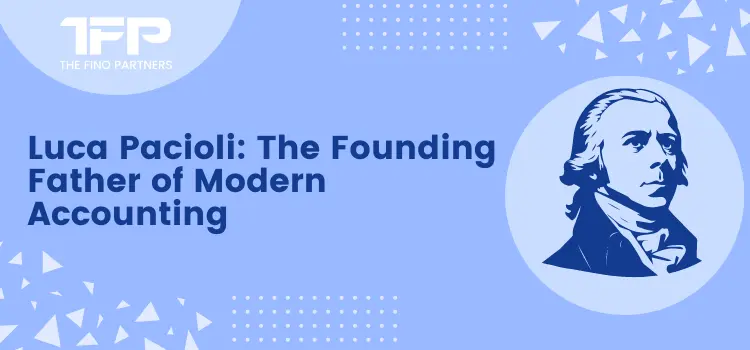Luca Pacioli is revered as the father of modern accounting. An Italian mathematician and Franscian priest by practice, his contributions are revolutionary to the field of accounting. He laid the groundwork for the double-entry accounting approach that is still in use today with his groundbreaking discoveries in the fifteenth century. Although he made contributions to many various areas, like algebra and geometry, his expertise in accounting is what has lasted. The fundamentals of double-entry bookkeeping were initially laid out in his Summa de Arithmetica, Geometria, Proportioni et Proportionalita, which first appeared in 1494. This article will try to shed light on the life led by the revered father of accounting. And how his contributions have led to the revolutionary ways of today’s society.
1. The life at a glance: The beaming torch to early life
In 1445, Luca Pacioli had been born in Tuscany, Italy's Borgo San Sepolcro. He studied mathematics in Venice as part of his early education. Living with a merchant family during that time exposed him to the accounting processes of the day, particularly those employed by traders in Italy's busy trading centers. His early experiences inspired his interest in accounting and mathematics. Notwithstanding his decision to train as a Franciscan friar, Pacioli remained to pursue his scholarly activities. Pacioli began teaching mathematics at organizations in Perugia, Naples, and Milan around the late 1400s. He had the chance to improve his accounting concepts throughout his teaching career and create the ground-breaking book that ultimately made him known worldwide.
2. The work that changed the world: Summa de arithmetica
A thorough treatise on mathematics, Summa de Arithmetica, Geometria, Proportioni et Proportionalita, was released in 1494 by Pacioli. The book was an encyclopaedia which covered several disciplines, such as geometry, algebra, and arithmetic. But it was Particularis de Computis et Scripturis (Details of Calculation and Recording), the section on double-entry bookkeeping, that established Pacioli's fame in the accounting community. Most people agree that the Summa provided the first thorough explanation of double-entry bookkeeping, a form of accounting that enables more precise financial record-keeping. Every financial transaction in this system is documented in at least two distinct accounts with equal and fighting entries, keeping the equilibrium of the accounting equation (Assets = Liabilities + Equity). This approach improved precision while providing businesses and merchants something more lucid.
3. The legacy left:Double-Entry Bookkeeping:
Financial record-keeping evolved by double-entry bookkeeping, making sure that transactions were logged so that errors could be promptly identified. The bookkeeper are aware that there was an error if, for example, the total of the debit and credit entries varied. The structure that this system provided for more accurate and transparent financial reporting is crucial for investors, businesses, and regulatory bodies. Evidence suggests that Venetian merchants were using double-entry accounting before Pacioli's ingenuity, but he was the first to organize and fully explain the method. With his efforts, double-entry accounting became common throughout Europe and later the rest of the world. Pacioli highlighted the significance of ethics in accounting in addition to counselling bookkeepers to be honest and diligent in their work. This emphasis on ethics remains a core principle in accounting to this day.
4. The influencer power: Pacioli’s impact on the world
A truly Renaissance guy, Luca Pacioli was close to some of the most brilliant minds of the time, such as Leonardo da Vinci. Over their many endeavors shared, Pacioli tutored Da Vinci in mathematics. Their collaboration influenced how science, mathematics, and art were viewed during the Renaissance by bridging the gap between these fields. Due in an essential component to Pacioli's work on double-entry bookkeeping, wide-scale commerce thrived during the Renaissance. Businesses required more advanced accounting techniques for managing intricate financial transactions as European trade connections grew. The *Summa*'s guiding principles gave businesses an opportunity to grow and prosper. Pacioli's seminal work remained relevant as accounting processes continued to change. His attempts played an important part in the eventual growth of modern times.
5. The dynamics of modern accounting: How Pacioli’s work impacted
The foundation of modern accounting procedures is still the double-entry bookkeeping method that Pacioli stated. It serves as the basis for financial reporting in practically every nation on earth and allows businesses to precisely monitor their equity, liabilities, and assets. Even though it is significantly more advanced, modern accounting software still follows the same principles as Pacioli did over 500 years ago. The importance of Pacioli's achievements is incalculable. His thorough documentation of accounting processes contributed to the profession's standardisation and made sure businesses could depend on accurate and uniform financial data. More complicated financial markets were made feasible by this standardisation, which relies on the precision and transparency double-entry bookkeeping offers. The concept of morality in accounting is still practised thanks to the brilliant ways theorised by pacioli. Ethics are still one of the utmost factors accountants have to care about when preparing financial reports. His legacy lives on in the way modern accountants approach their work with precision, honesty, and attention to detail.
Conclusion
Luca Pacioli made the impossible possible. His contributions left a deep impact in accounting. The revolutionary double-entry bookkeeping, a genius concept theorised by pacioli, is still in use today. Through the records of a system that enhanced fiscal accountability, openness, and accuracy, Pacioli helped to the expansion of global economies and also to the world of business. His influence on the field has stood the test of cementing his reputation as the father of modern accounting. Today, when financial transparency is more essential than ever, accountants and businesses across the world still employ Pacioli's concepts as a direction.




























